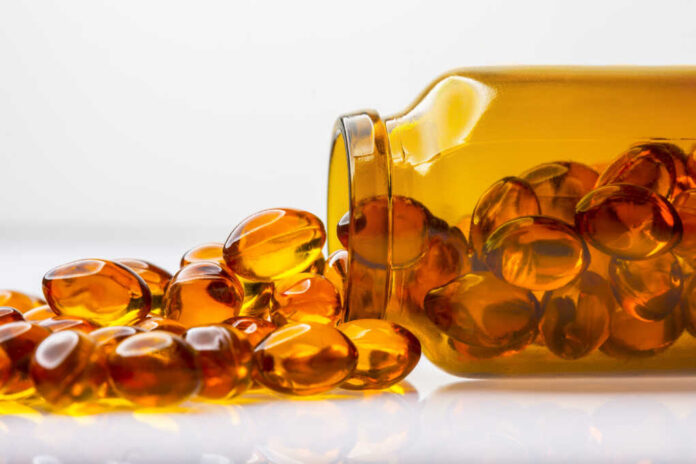
Vitamin D toxicity, or hypervitaminosis D, is a rare but serious condition resulting from excessive vitamin D levels in the body.
It typically occurs due to high doses of vitamin D supplements rather than dietary sources or sun exposure. The body regulates sun-induced vitamin D production, and fortified foods contain only modest amounts of the vitamin.
The primary consequence of vitamin D toxicity is hypercalcemia, leading to symptoms like nausea, weakness, and increased urination. In severe cases, it can lead to bone pain and kidney issues, such as calcium stone formation.
Treatment involves discontinuing vitamin D intake, limiting dietary calcium, and, in some cases, administering intravenous fluids and medications like corticosteroids or bisphosphonates.
Excessive intake, such as 60,000 international units (IU) per day for several months, has been linked to toxicity—far exceeding the recommended daily allowance (RDA) of 600 IU for most adults.
While higher doses may be used under medical supervision to address deficiencies, regular monitoring of blood levels is essential. It’s crucial to consult a doctor before starting any vitamin or mineral supplements.
How Much Vitamin D Is Too Much?
Vitamin D toxicity typically arises from excessive vitamin D supplement consumption, not from diet or sun exposure.
According to the NIH, the vitamin D toxicity vary by age group:
- 0–6 months: 25 mcg (1,000 IU)
- 7–12 months: 38 mcg (1,500 IU)
- 1–3 years: 63 mcg (2,500 IU)
- 4–8 years: 75 mcg (3,000 IU)
- 9 years and older: 100 mcg (4,000 IU)
While rare, the rise in supplement usage has led to more reported toxicity cases. Symptoms tend to emerge with daily intakes exceeding 10,000 IU (250 mcg), but even smaller doses below the Tolerable Upper Intake Level (UL) of 4,000 IU (100 mcg) could pose risks over time.
Individuals with toxicity often exhibit blood levels surpassing 150 ng/mL (375 nmol/L). Errors in manufacturing or labeling have also contributed to cases where products contained significantly higher vitamin D concentrations than indicated.
While treatable, severe toxicity can lead to complications such as kidney failure, irregular heartbeat, and soft tissue calcification.
Discussions persist regarding safe upper limits for vitamin D. Recent research suggests that a daily intake of 10,000 IU over three years in older adults did not escalate arterial calcification.
Common Symptoms of Excessive Vitamin Intake
Here are some common symptoms of vitamin D toxicity:
Elevated Blood Levels:
- Vitamin D levels surpassing 100 nanograms per milliliter (ng/mL) are considered excessive.
- Toxicity, or hypervitaminosis D, is defined by serum levels exceeding 150 ng/mL.
- Optimal vitamin D levels typically range from 30–60 ng/mL, aiding in illness prevention.
- Toxicity is often linked to inappropriate supplement dosing and prescription errors.
Elevated Blood Calcium Levels (Hypercalcemia):
- Excessive vitamin D consumption enhances calcium absorption, potentially leading to hypercalcemia.
- Symptoms include digestive distress, fatigue, confusion, and kidney issues.
- Blood calcium levels above the normal range of 8.5–10.8 mg/dL may indicate hypercalcemia.
- Severe hypercalcemia can be life-threatening and necessitates immediate medical attention.
Gastrointestinal Symptoms:
- Excessive vitamin D can elevate blood calcium levels, causing gastrointestinal issues.
- Symptoms may include nausea, vomiting, constipation, diarrhea, and appetite loss.
- Symptoms can arise from extremely high doses and resolve upon supplement cessation.
Altered Mental Status:
- Hypercalcemia induced by vitamin D toxicity can lead to mental alterations.
- Symptoms may include confusion, depression, psychosis, and in severe cases, coma.
- Mental status changes can persist until calcium levels return to normal.
Kidney Complications:
- Vitamin D toxicity can result in kidney injury and failure due to excessive calcium levels.
- High calcium levels may lead to kidney calcification and decreased kidney function.
- Studies have reported kidney injury in individuals with vitamin D toxicity.
- Optimal vitamin D levels are crucial for kidney health, as both deficiency and excess can harm renal function.



















